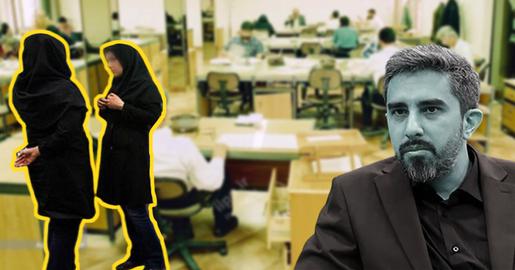Five years on and the war in Syria continues to rage on with increasing deadliness. And yet, despite that, some Iranian airlines continue to fly in and out of the war-torn country. But why? And who or what are the airplanes transporting?
Syria has long been popular with Iranians pilgrims, in particular the Zeinab Mosque in southern Damascus, an important religious site for Shia devotees, who believe the grave of Zeinab, the Prophet Mohammad’s granddaughter and daughter of Imam Ali, is located there. In Shia Islam, Imam Ali is regarded as the prophet’s true successor, so visiting the mosque is important for many Iranians.
But now that the risks are so high, have Iranians stopped going? Are they even permitted to go? Over the last four years, high-ranking officials have made contradictory statements on the topic, with some stating that Iranians are banned from traveling to Syria and others hinting at just the opposite.
“Once a week, a train leaves Tehran for Syria but it’s forbidden to travel by land to Syria,” said Mahmoud Sadeghi, head of the Passport Bureau Police, back in early 2012. “It isn’t possible for Iranian nationals or pilgrims to travel to Syria by rail until we can guarantee their safety.”
Sadeghi added, “If they want to go, they should travel by plane as that way we can guarantee the safety of Iranians who are traveling to Syria for the Hajj pilgrimage tour.”
But much has happened since Sadeghi made his remarks about flying in 2012. For a start, the situation in Syria has worsened drastically, developing into a fully-fledged civil war. Terrorists also began targeting buses carrying Iranian pilgrims to Syria. There was a series of attacks against opponents of the Bashar al-Assad regime and then, in June 2012, a car bomb attack outside the Zeinab mosque left 14 people injured. Since the incident, Sunni extremists fighting the Assad regime have continued to target the mosque.
“We have to be more careful with regard to pilgrimage tours,” Hojatoleslam Shahsavari, a high official of the Hajj and Pilgrimage Organization told Mehr News Agency in August 2012. “We have to wait until we’re told that there aren’t any problems with these tours so that we can resume them through authorized travel agencies and [official] caravans.”
However, just a week later, armed groups in the area took 48 Iranian pilgrims hostage, the largest number of pilgrims kidnapped to date. The hostages spent a total of 150 days in captivity and were only released when Turkey and Qatar intervened and mediated — at a cost of 2,130 prisoners being released from Syrian jails in exchange. Later, in winter 2012, 11 men on a pilgrimage tour were taken hostage. Several similar incidents occurred before the ban was eventually imposed.
Before the ban was brought in, it is estimated that approximately 8,000 Iranian pilgrims traveled to Syria by land as part of official tours every week, and that nearly 6,000 used travel agencies to make the same journey, according to the Hajj and Pilgrimage Organization.
But despite earlier warnings and the increased risk of going to Syria today, the head of Iran’s Hajj and Pilgrimage Organization, Saeed Ohadi, told the Islamic Republic News Agency in August this year that Iran’s Foreign Ministry and the Iranian embassy in Damascus were pursuing efforts to send Iranian pilgrims to Syria, and discussing the matter with the Syrian tourism minister. Ohadi said the organization had written to the relevant Syrian officials in the hopes of opening discussions with Syrian counterparts.
Given the contradictory nature of statements from Iranian officials and Saeed Ohadi in August 2015, I decided to contact travel agencies to ask them about pilgrimage tours to Syria.
The first agency I called was Chalak Parvaz. “We’ve not had tours to Syria for a long time,” a woman called Mahsa told me. “There’s no demand for it. Mahan Airline and Iran Air have a limited number of flights but they sell tickets via the internet and not through travel agencies. We can’t sell them to clients.”
Mahsa explained to me that as demand fell, supply automatically stopped as well. “The few people who still want to go on pilgrimage in Syria can contact a few airlines directly. But I can’t see why anybody would want to travel to Syria unless they study there or have relatives in Syria.” Mr Arian, who works for Golha Travel Agency, agreed about the fall in demand. He added that travel by train and bus had stopped too. Ms. Parvaneh, an employee at Silk Road Travel Agency, told me that as soon as things improve in Syria, however, pilgrimages will recommence — but for now there is little sign of that.
Hamid, an employee at Mahan Airline in Tehran, said that although Mahan Airline flies twice a week to Syria, these flights are not intended for pilgrimage tours. “Every week, Mahan Airline flies to Damascus on Sunday and Tuesday but these flights are mostly for transporting medical equipment and supplies sent in by the Red Crescent,” Hamid said, “although there are very occasionally Iranians who study in Syria or Iranian residents who live in Damascus that want to fly there.”
According to a recent investigation by the Business Insider, however, Mahan Air flights departing from Iran to Syria are not only not on a set schedule, there are even occasions where the planes fail to broadcast their destination, all of which serves to abet the Assad regime. This is because it allows the Syrian President to maintain a sense of normalcy in the country, as well as a degree of cover when it comes to the aerial resupply of the regime.
Although the Hajj and Pilgrimage Organization refused to comment on the issue of whether pilgrimages could start up again, it would seem from remarks made by its head Saeed Ohadi that it is keen to renew pilgrimages to Syria — much keener than most Iranian pilgrims actually are. Given the state of affairs in Syria at the moment, that seems perfectly reasonable.
Related articles:


























comments